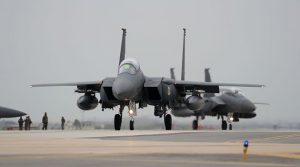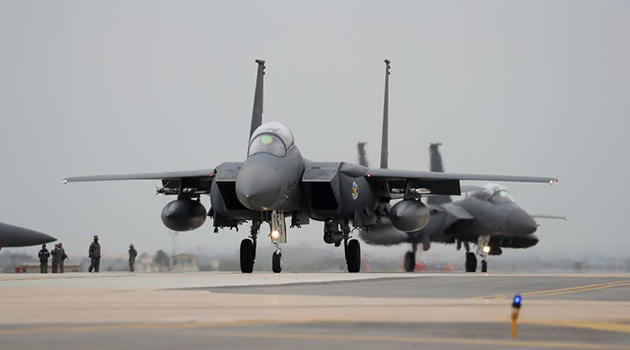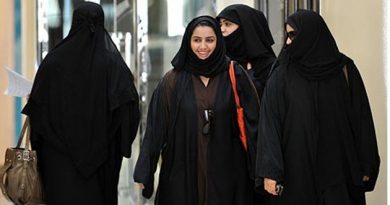North Korea’s Warning to U.S. Throws Trump Summit Into Doubt

North Korea abruptly canceled talks with South Korea and warned the U.S. to “think twice” about the fate of President Donald Trump’s planned meeting with Kim Jong Un next month, tamping down hopes of a breakthrough at the historic summit.
North Korea told South Korean authorities just after midnight local time that it was suspending “indefinitely” minister-level talks planned for Wednesday, South Korea’s Unification Ministry said. Kim’s regime cited U.S.-South Korean military drills and “improper acts” by authorities in Seoul in canceling the meeting, adding: “There is a limit in showing goodwill and offering opportunity.”
South Korea expressed regret over the cancellation and urged North Korea to resume talks to discuss implementing last month’s peace declaration, Unification Ministry spokesman Baik Tae-hyun told reporters in Seoul. Stocks tied to expectations of a resumption in inter-Korean business fell on Wednesday.
North Korea’s move undercuts some of the optimism after Kim agreed to discuss his nuclear weapons program in a first-of-its-kind summit with Trump on June 12 in Singapore. Tensions have built in recent weeks over the steps needed for the U.S. to ease sanctions against North Korea: The Trump administration wants Kim to give up his weapons before getting anything in return, while Kim favors a more phased approach.
Analysts noted the statement from the state-run Korean Central News Agency wasn’t signed by Kim or the military, and wasn’t likely to lead to a cancellation of the summit. Kim has pledged to publicly dismantle a nuclear test site next week and said he had no need for nuclear weapons if the U.S. ended its “hostile policies.”
“Kim really wants this summit,” said David Kang, director of the Korean Studies Institute at the University of Southern California. “The whole process has been going so smoothly since January, I would be more surprised if there wasn’t a reminder that Kim Jong Un and North Korea have a lot of cards to play.”
White House Press Secretary Sarah Huckabee Sanders said that officials “are aware” of North Korea’s remarks. “The United States will look at what North Korea has said independently, and continue to coordinate closely with our allies,” she said.
North Korea has in recent weeks issued repeated complaints about Trump administration efforts to maintain its “maximum pressure” campaign against the regime in the run up to the meeting. The KCNA statement specifically cited the deployment of B-52 bombers, which are capable of carrying nuclear bombs, and F-22 fighter jets as evidence of threatening behavior by the U.S.
“The U.S. will have to think twice about the fate of the DPRK-U.S. summit now on high agenda before a provocative military racket against the DPRK in league with the south Korean authorities,” KCNA said Wednesday, using an abbreviation for North Korea’s formal name. “We will closely watch the ensuing behavior of the U.S. and the South Korean authorities.”
North Korea also accused South Korea of permitting behavior that undermined the agreement at the Moon-Kim summit, saying that Seoul was “allowing even human scum to brazenly hurl mud at the dignity of the supreme leadership” of North Korea.
The KCNA report appeared to be referring to Thae Yong-ho, a former deputy at the North Korean embassy in London who defected to South Korea in 2016. In comments to parliament this week, Thae said he didn’t believe Trump and Kim would agree on complete, verifiable and irreversible dismantlement of North Korea’s weapons, adding that Pyongyang would demand a guarantee that the Kim family could rule the nation forever.
“We’re not sure of the North’s intention and will try to figure it out,” Baik, the Unification Ministry spokesman, said when asked if the KCNA statement was referring to Thae. North Korea hasn’t raised the issue of military exercises during any recent communications, he said.
South Korea’s Yonhap News Agency reported Wednesday that the U.S. won’t send B-52 bombers for the military drills, citing unidentified local military and government officials. The South Korean Ministry of National Defense said in a text message that the allies would proceed with the exercises as planned.
Colonel Rob Manning, a U.S. Defense Department spokesman, said in a statement that the exercises now underway are annual drills aimed at maintaining “a foundation of military readiness.” He said the drills’ defensive nature “has been clear for many decades and has not changed.”
U.S. officials including Secretary of State Mike Pompeo — who has met Kim twice in recent months — have said they believe North Korea’s new willingness to talk is genuine, and the result of a tighter sanctions regime that has inflicted new pain on the isolated country’s economy. State Department spokeswoman Heather Nauert said planning for the Singapore summit continues and that the U.S. hasn’t received any notification about potential hurdles.
‘Complete Denuclearization’
The summit in Singapore is shaping up to be one of the biggest foreign policy tests of the Trump administration, coming after a year in which the two countries’ leaders traded personal insults and threats of war as North Korea ramped up its tests of intercontinental ballistic missiles and nuclear bombs.
The U.S. has said it would demand “complete denuclearization” of the Korean peninsula before granting economic concessions to Pyongyang. While Kim has already released three American prisoners and announced plans to shutter the country’s Punggye-ri testing ground, many foreign policy experts are skeptical he will ever fully relinquish his nuclear capabilities.
‘Softer Target’
Van Jackson, a strategy fellow at the Center for Strategic Studies at Victoria University of Wellington, and a former U.S. Department of Defense adviser, said Kim was either trying to secure early concessions from the Trump administration or manage domestic apprehension about rapprochement with the U.S.
“If the alliance exercises proceed, that’s an indication that the alliance isn’t going to bend for North Korea and ‘maximum pressure’ will likely stay in place for the foreseeable future,” Jackson said. “If the alliance curtails its exercises in the name of diplomatic engagement, then North Korea knows it’s got a softer target — more room to press for greater demands.”
Courtesy : Bloomberg
Photo : Bloomberg
[social_warfare buttons=”Facebook,Pinterest,LinkedIn,Twitter,Total”]



